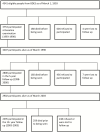The Contribution of Ototoxic Medications to Hearing Loss Among Older Adults
- PMID: 31282945
- PMCID: PMC7328195
- DOI: 10.1093/gerona/glz166
The Contribution of Ototoxic Medications to Hearing Loss Among Older Adults
Abstract
Background: Ototoxicity may interact with the effects of aging, leading to a more severe hearing loss than that associated with age alone. The purpose of this study was to explore the associations between ototoxic medication use and the incidence and progression of hearing loss in older adults with a population-based longitudinal study.
Methods: Epidemiology of Hearing Loss Study participants (n = 3,753) were examined. Medication use was assessed using a standardized questionnaire by the examiners at each examination every 5 year. The ototoxic medications include loop diuretics, nonsteroidal anti-inflammatory drugs, antibiotics, chemotherapeutic agents, quinine, and acetaminophen in this study. Generalized estimating equations model was used as a proportional hazard discrete time analysis.
Results: Number of ototoxic medications was associated with the risk of developing hearing loss during the 10-year follow-up period (hazard ratio [HR] = 1.15, 95% confidence interval [CI] = 1.06, 1.25) after adjusting for age, sex, smoking, and body mass index. Loop diuretics (HR = 1.40, 95% CI = 1.05, 1.87) were associated with the 10-year incidence of hearing loss. Nonsteroidal anti-inflammatory drugs (HR = 1.45, 95% CI = 1.22, 1.72) and loop diuretics (HR = 1.33 95% CI = 1.08, 1.63) were associated with risk of progressive hearing loss over 10 years.
Conclusion: These ototoxic medications are commonly used in older adults and should be considered as potentially modifiable contributors to the incidence and severity of age-related hearing loss.
Keywords: Hearing loss; Medication; Risk factors.
© The Author(s) 2019. Published by Oxford University Press on behalf of The Gerontological Society of America. All rights reserved. For permissions, please e-mail: journals.permissions@oup.com.
Similar articles
-
Prevalence of ototoxic medication use among older adults in Beaver Dam, Wisconsin.J Am Assoc Nurse Pract. 2018 Jan;30(1):27-34. doi: 10.1097/JXX.0000000000000011. J Am Assoc Nurse Pract. 2018. PMID: 29757919 Free PMC article.
-
Pattern of ototoxicity in a Nigerian teaching hospital.Niger J Med. 2010 Jul-Sep;19(3):320-3. doi: 10.4314/njm.v19i3.60226. Niger J Med. 2010. PMID: 20845639
-
Factors affecting sensitivity of distortion-product otoacoustic emissions to ototoxic hearing loss.Ear Hear. 2008 Dec;29(6):875-93. doi: 10.1097/AUD.0b013e318181ad99. Ear Hear. 2008. PMID: 18753950 Clinical Trial.
-
[Drugs ototoxicity. Part II. Loop diuretics, nonsteroidal anti-inflammatory drugs, antineoplastic and antimalarial drugs ].Wiad Lek. 2003;56(7-8):369-74. Wiad Lek. 2003. PMID: 14969167 Review. Polish.
-
Understanding drug ototoxicity: molecular insights for prevention and clinical management.Expert Opin Drug Saf. 2006 May;5(3):383-99. doi: 10.1517/14740338.5.3.383. Expert Opin Drug Saf. 2006. PMID: 16610968 Review.
Cited by
-
Traditional Chinese medicine for the prevention and treatment of presbycusis.Heliyon. 2023 Nov 28;9(12):e22422. doi: 10.1016/j.heliyon.2023.e22422. eCollection 2023 Dec. Heliyon. 2023. PMID: 38076135 Free PMC article. Review.
-
A disproportionality analysis of adverse events associated with loop diuretics in the FDA Adverse Event Reporting System (FAERS).BMC Pharmacol Toxicol. 2025 Mar 17;26(1):63. doi: 10.1186/s40360-025-00890-7. BMC Pharmacol Toxicol. 2025. PMID: 40098168 Free PMC article.
-
Presbycusis: An Update on Cochlear Mechanisms and Therapies.J Clin Med. 2020 Jan 14;9(1):218. doi: 10.3390/jcm9010218. J Clin Med. 2020. PMID: 31947524 Free PMC article. Review.
-
Review of Ototoxic Drugs Using Health Insurance Data: A Data-Driven Management System.OTO Open. 2025 Apr 25;9(2):e70121. doi: 10.1002/oto2.70121. eCollection 2025 Apr-Jun. OTO Open. 2025. PMID: 40291857 Free PMC article.
-
Association Between Hypertension and Hearing Loss.Cureus. 2021 Sep 16;13(9):e18025. doi: 10.7759/cureus.18025. eCollection 2021 Sep. Cureus. 2021. PMID: 34692272 Free PMC article.
References
-
- National Institute on Deafness and other Communication Disorders (NIDCD). Age-related hearing loss 2016; https://www.nidcd.nih.gov/health/age-related-hearing-loss. Accessed March, 23, 2018.
-
- Peterson M. Physical aspects of aging: is there such a thing as ‘normal’? Geriatrics. 1994;49:45–49; quiz 50. - PubMed
-
- Pyykko I, Toppila E, Zou J, Kentala E. Individual susceptibility to noise-induced hearing loss. Audiol Med. 2007;5:41–53. doi: 10.1080/16513860601175998


